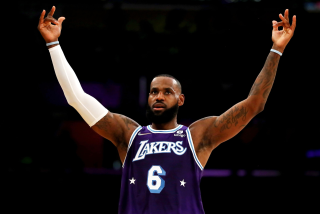History Would Seem to Be on Jordan’s Side
- Share via
The public adores great athletes in their prime, yet frets over them like decrepit family members when they’re in their athletic dotage. The chorus of concern, the dirge of doubts, about Michael Jordan’s remaining ability can already be heard across the land.
Jordan faces so many skeptics, you’d think he was 88, not 38. To hear people talk, you’d assume he was picked as the greatest athlete of the 19th century. Nowhere can you find a single person who thinks Jordan will be virtually indistinguishable from the man who retired three years ago. An 11th scoring championship? Are you kidding? Nobody mentions it. Jordan says over and over that he would never come back unless he could play up to his standard.
But find me one person who believes him.
Actually, I believe him. And I’ll prove my point. Plenty of historical evidence suggests that Jordan may be almost as good as when he was last seen in the NBA. You remember that guy, don’t you? Sneaky Air, flagrantly pushing off, and getting away with it, to sink the shot that won his sixth NBA championship ring.
First let’s see a sample of the consensus of NBA wise men. Boy, are they in for a big surprise.
“In the beginning it’ll be great. In the middle, it’s going to be fair. In February, he may be saying, “What the hell am I doing here?’ ” said ex-Celtics coach and general manager Red Auerbach.
“All that stuff about him jumping from the foul line (to dunk) is over,” said ex-Georgetown coach John Thompson. “His game is going to be on the floor now. We’re going to start calling him Floor Jordan.”
Dallas owner Mark Cuban, who leads the NBA in callow, has said that young stars such as Kobe Bryant and Allen Iverson will clean the floor with Jordan. Cuban has even volunteered the name of the Mavs’ Michael Finley as a candidate to use Jordan as his personal mop. (You’ll notice Finley himself didn’t say it.)
Even Jordan’s hand-picked coach, Doug Collins, will only venture he thinks Jordan will be “one of the 10 best players in the league.” Ten best? That’s it? What happened to Best of All Time?
Everyone has an opinion. But few, it seems, have done an iota of simple research. After all, Jordan is not the first human to try to play in the NBA at 38. Far from it. This isn’t uncharted territory. There’s a whole record book full of facts as to the performance level of Hall of Fame players -- especially those famous for their superb conditioning when they were Jordan’s age.
The three players who offer perhaps the best parallels to Jordan are Kareem Abdul-Jabbar, John Havlicek and Robert Parish. All had long careers. All, like Jordan, were renowned for their fitness. All played until there was no gas left in their tanks. They give us test cases of the degree of deterioration caused by NBA age.
So, when they were 38, how well did they play? How much had their statistics fallen from their career-long averages? If Jordan avoids a major injury, and plays as they did, what can we expect?
When Abdul-Jabbar was Jordan’s age, he scored 23.4 points a game, shot .564 from the field and, all in all, was the same player he’d been the three previous seasons. His career scoring average was 24.6 and his career shooting percentage .559. In other words, at Jordan’s age Kareem was still Kareem. Or, at least, he was more than 90 percent of his old self. Abdul-Jabbar was the Lakers’ starting center on world championship teams when he was 37, 39 and 40.
If Abdul-Jabbar could keep hitting his sky hook with grace and easy, why on earth won’t Jordan be able to make his fall-away jumper?
The answer is: He will.
If anything, Jordan has an advantage no other 38-year-old NBA player has ever had. Very low mileage. Not only has he been retired for three years but he took almost two seasons off to play baseball. His odometer has barely rolled over. Jordan has played in only 1,109 games, including playoffs. Abdul-Jabbar played in 1,797.
Parish, who played until he was 43, offers an even more striking example. At 37 and 38, his two-year scoring average was above his career average. None of his other stats suffered. And, like Abdul-Jabbar, he cut his minutes-per-game by only five, at most. At Jordan’s age, Parish still made the all-star team.
Finally, since Havlicek was a swing-man who counted on all-around athleticism, he may be the best comparison. At 38, he still played 34 minutes a night. His points-per-minute was 83 percent of his career average. His percentages from the field and the foul line were above his career levels. And he was an all-star. If Jordan “deteriorates” as much as Hondo, he’d still score 24 points a game.
If we want to guess Jordan’s scoring average this year, let’s compare his career-long mark of 31.5 to Abdul-Jabbar, Parish and Havlicek. (Come on, you’re going to tell me that Michael Jordan isn’t as good as these guys?) As a group, this trio scored 91.3 percent as many points at the age of 38 as they did in their whole careers.
For Jordan, that would be 28.8 points a game. In the pool, put me down for 26.5 points and second in the NBA in scoring.
Nobody thinks, or certainly predicts, that Jordan can do this. Even he probably doesn’t believe it or expect it. But the feeling here is that he’s going to surprise himself.
After all, what’s Jordan’s excuse? When Havlicek was Jordan’s age, he’d played about 300 more games. Basketball wears down a player’s joints and ligaments year by year. Jordan hasn’t been retired. He’s been in extended rehab! He ain’t been rustin’. He’s just been restin’.
Everybody knows that Jordan can get hurt. Age is injury. That’s how time expresses itself in an athlete. When you’re whole, you’re still very close to what you once were. But how long can you stay intact? During his comeback workouts, Jordan has already knee tendinitis, back spasms and two broken ribs. So, Jordan can break.
But what if he doesn’t? That’s what very few, including the Wizards, are considering.
Basketball has lost its perspective. Maybe 38 is old in the NBA. But it’s not ancient. At 37, Julius Erving’s playoff scoring average was just 2.7 points below his career average. At 37, Dominique Wilkins was still scoring almost 20 points a game, too. They both played the high-flying Air game.
Don’t worry about Mike. Worry about the guys who have to guard him. The fun is just resuming. If you don’t believe it, take a look at history.
More to Read
Go beyond the scoreboard
Get the latest on L.A.'s teams in the daily Sports Report newsletter.
You may occasionally receive promotional content from the Los Angeles Times.










